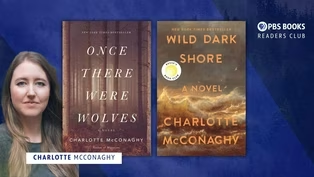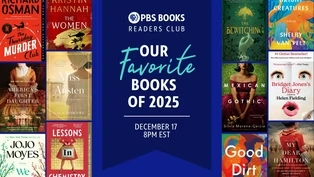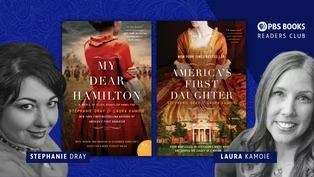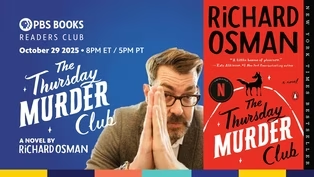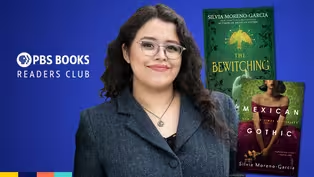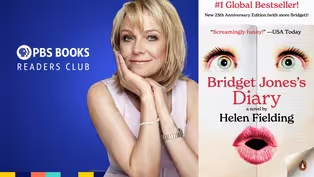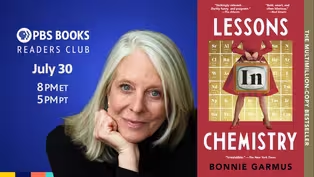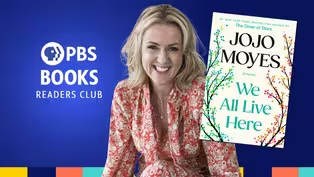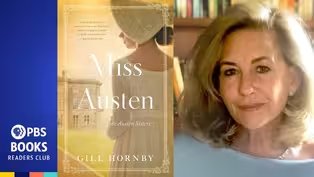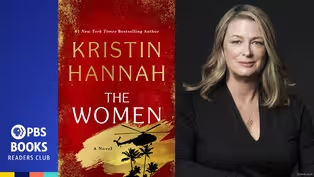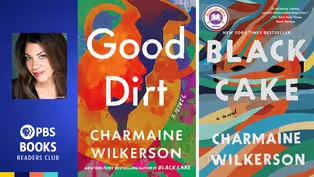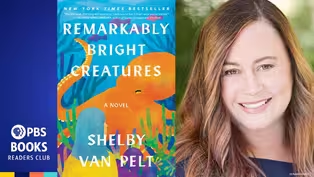
Readers Club | Ep. 206: Our Favorite Cozy Murder Mysteries
Season 2025 Episode 33 | 52m 32sVideo has Closed Captions
PBS Books Readers Club hosts a special event sharing Our Favorite Cozy Murder Mysteries
PBS Books Readers Club hosts a special event sharing Our Favorite Cozy Murder Mysteries from Masterpiece and the authors who wrote the amazing novels that inspired them. The episode premieres on June 25th at 8PM ET as a PBS Books Facebook Live event, on the PBS Books YouTube channel, pbsbooks.org, and the PBS app.
Problems playing video? | Closed Captioning Feedback
Problems playing video? | Closed Captioning Feedback

Readers Club | Ep. 206: Our Favorite Cozy Murder Mysteries
Season 2025 Episode 33 | 52m 32sVideo has Closed Captions
PBS Books Readers Club hosts a special event sharing Our Favorite Cozy Murder Mysteries from Masterpiece and the authors who wrote the amazing novels that inspired them. The episode premieres on June 25th at 8PM ET as a PBS Books Facebook Live event, on the PBS Books YouTube channel, pbsbooks.org, and the PBS app.
Problems playing video? | Closed Captioning Feedback
How to Watch PBS Books
PBS Books is available to stream on pbs.org and the free PBS App, available on iPhone, Apple TV, Android TV, Android smartphones, Amazon Fire TV, Amazon Fire Tablet, Roku, Samsung Smart TV, and Vizio.
Providing Support for PBS.org
Learn Moreabout PBS online sponsorshipMore from This Collection
The PBS Books Readers Club is a monthly digital-first series that brings its members into conversations behind the stories of your favorite books & shows. You can watch the online on the PBS App, with extended interviews available for PBS members on PBS Passport.
Readers Club | Ep 301: Charlotte McConaghy | Once There Were Wolves
Video has Closed Captions
PBS Books Readers Club hosts author Charlotte McConaghy to discuss her novel Once There Were Wolves. (58m 55s)
Readers Club | Ep. 212: Our Favorite Books of 2025
Video has Closed Captions
PBS Books Readers Club celebrates the wrap of its second season with a highlight of 2025 (47m 55s)
Readers Club | Ep. 211: America's First Daughter | Stephanie Dray & Laura Kamoie
Video has Closed Captions
PBS Books Readers Club welcomes co-authors Stephanie Dray and Laura Kamoie (1h 1m 45s)
Wed Oct 29 2025 | Readers Club | Ep. 210: Richard Osman | Thursday Murder Club
Video has Closed Captions
PBS Books Readers Club welcomes celebrity writer Richard Osman to discuss his best-selling novel (52m 44s)
Readers Club | Ep. 209: Silvia Moreno-Garcia | The Bewitching and Mexican Gothic
Video has Closed Captions
PBS Books Readers Club welcomes award winning author Silvia Moreno-Garcia to discuss her new book. (52m 42s)
Readers Club | Ep. 208: Helen Fielding | Bridget Jones's Diary
Video has Closed Captions
PBS Books Readers Club welcomes beloved British author Helen Fielding to discuss her iconic novel (59m 30s)
Readers Club | Ep. 207: Lessons in Chemistry | Bonnie Garmus
Video has Closed Captions
PBS Books Readers Club welcomes international best-selling author Bonnie Garmus to discuss her novel (49m 3s)
Readers Club | Ep. 205: We All Live Here | Jojo Moyes
Video has Closed Captions
PBS Books Readers Club welcomes international & New York Times best-selling author Jojo Moyes (57m 37s)
Readers Club | Ep. 204: Miss Austen | Gill Hornby
Video has Closed Captions
PBS Books Readers Club welcomes international best-selling author Gill Hornby to discuss her novel (51m 18s)
Readers Club | Ep. 203: The Women by Kristin Hannah
Video has Closed Captions
PBS Books Readers Club welcomes international best-selling author, Kristin Hannah to discuss novel. (53m 29s)
PBS Books Readers Club | Ep. 202: Good Dirt & Black Cake | Charmaine Wilkerson
Video has Closed Captions
PBS Books Readers Club is delighted to welcome critically acclaimed author Charmaine Wilkerson (55m 29s)
PBS Books Readers Club | Episode 201 | Remarkably Bright Creatures | Shelby Van Pelt
Video has Closed Captions
PBS Books Readers Club launches season two with award-winning author Shelby Van Pelt. (57m 40s)
Providing Support for PBS.org
Learn Moreabout PBS online sponsorship(upbeat music) - I think they are a treat.
And you can watch these shows, and not think of anything else except for, "Where are the clues?
Who did it?
What is the writer doing here?
What am I meant to think?"
And just enjoying it until you reach the one thing that a murder mystery always brings in, which we really do need in this day and age, and that is the truth, the absolute truth.
(upbeat music continues) - Hey, and welcome to the "PBS Books Readers Club".
Today's episode is a special celebration of one of the most beloved genres in fiction: cozy murder mysteries.
- Love it.
These stories bring a delightful twist to crime solving featuring eccentric characters, small-town charm, and puzzles that keep readers guessing.
Somehow these gems manage to make murder feel comforting.
- Yeah, and cozy mysteries are rooted in literature with iconic authors like Agatha Christie defining the rules of the genre.
They're smart, character-driven, focused on the how and the why of a murder, rather than just the cheap thrills of blood and violence.
Although that's nice too.
- Just a little bit.
(everyone laughing) - Many of our favorite cozy novels have made their way to the PBS screen, including "The Marlow Murder Club", "Magpie Murders", "Moonflower Murders", and "Grantchester".
- Today, we'll explore how these books were written, the minds behind them, and how they've charmed their way onto our bookshelves, and our screens.
- And stick around because, at the end of the episode, we'll share our absolute favorite cozy mystery book recommendations.
You might just find your next great read.
- Hi, I am Fred Nahhat, alongside Lauren Smith, Princess Weekes is our literary expert and author, and Heather-Marie Montilla, our resident librarian and PBS Books national director.
- [Lauren] We have a lot to discuss, but mostly we want to hear from you.
Please, introduce yourself in the chat, and we love to know what brought you here today, and we so enjoy reading and responding to your comments in the chat.
- Well, the game is afoot.
Before we hear more about these authors, let's talk about how you can connect with the "PBS Books Readers Club".
- Sign up for our "PBS Books" e-newsletter at pbsbooks.org/subscribe for exclusive book recommendations, author interviews, and more.
It's a fun way to get the latest book updates straight to your inbox.
- Looking for fascinating discussions with your favorite authors?
On the "PBS Books" YouTube channel, you'll find hundreds, including Geraldine Brooks, Percival Everett on his bestseller "James", Kristin Hannah on "The Women", and more.
Subscribe now, if you haven't already, and immerse yourself in these amazing interviews.
- And if you love the "PBS Books Readers Club", consider supporting your local PBS station.
This program and your station are counting on support from viewers just like you and me.
So, now more than ever, please, if you can, visit pbsbooks.org/donate to make a gift.
- pbsbooks.org/donate will take you right to your local station's Giving page.
There, among many thank you gift options, you can support this program by choosing a "PBS Books Readers Club" mug, just like we have here on the set, which, on the back, says, "My weekend is booked."
- [Lauren] It's so cute.
- [Fred] I just got that.
Certainly true (Lauren laughing) for most of all of us.
- [Lauren] Or you can select the "PBS Books Readers Club" book bag.
This adorable yellow tote is the perfect way for you to carry around your books, e-reader, and more.
The strap is adjustable, so you can use it as a cross body, shoulder tote, or handbag.
- And did you know that when you become a member of your local PBS station by making a qualifying donation, you'll unlock full seasons of your favorite mysteries on the PBS app, including masterpiece mysteries like "The Marlow Murder Club", "Grantchester", and "Magpie Murders".
- If you haven't seen it yet, "Magpie Murders" is a gripping mystery series based on the bestselling novel by Anthony Horowitz.
Set in both the present day and in the world of a fictional 1950s detective story, the show follows book editor Susan Ryeland as she uncovers a web of intrigue when the manuscript for a highly anticipated novel goes missing, and the author turns up dead.
Combining a classic whodunnit with a clever twist, "Magpie Murders" keeps viewers and readers on the edge of their seats, blending suspense, dark secrets, and an intriguing puzzle that will leave you guessing until the very end.
- PBS members can watch "Magpie Murders" and a whole assortment of other masterpiece mystery series on the PBS app.
(gentle upbeat music) - So many of our favorite PBS shows are based on remarkable novels, and I'm always curious about the mindset of a murder mystery writer.
The authors that we've talked to, they seem like delightful people.
How was it that these like murder ideas come from their brains?
- Right.
- It's true, I mean, I think I loved hearing from both Anthony Horowitz, Robert Thorogood, and also Daisy Coulam, and really thinking about what's going on as they're writing.
And I also think about, you know, someone, the quintessential writer in this genre would be Arthur Conan Doyle who wrote "Sherlock Holmes".
He didn't wanna write murder mysteries.
That's what's so intriguing, right?
He wanted to write romance novels.
And so when you think about, - I didn't know that.
- right, and you think about and he did - I got notes.
- "Sherlock Holmes", that was really, he went back to that to earn money.
The people we are talking to, this is what they wanna do, and they wanna craft puzzles, and they wanna take us on this journey, and they wanna create these complex characters.
And there's so much, I think, when you think about this duality of murder is nasty, right, it's this ugly thing in society that, if we see it, you know, we're horrified, hopefully, none of us will ever see it, but I say that to say that it's amazing, because we're captivated and we wanna read more.
- I think that's why setting is so important, because you really want to make the audience feel like you're going on an adventure.
Like that's why it's usually in like a small town.
Because it feels intimate.
Because that's where you go to be safe.
It's not happening in like South London.
It's happening in these cozy, little, quiet places, and so it feels intimate, 'cause, you know, whoever did it must have really meant it, because they're in a nice area doing things.
And I think even if you go back to "Sherlock Holmes", it's usually that kind of intersection of class as well of like people trying to hold on to things, and hold onto to inheritances.
So as a layperson, just kind of like, "Ha ha ha."
You know, like there's a little bit of Sigmund Freud of being able to watch people like who think they've gotten so far away from danger, how it kind of engrosses them right back in.
It reminds us like, you know, that thrillingness of everything.
- I recall talking to author Tana French who wrote "The Searcher" and "The Hunter", and I think we asked her like, "You seem so upbeat and positive."
And she said- - Great cat lady, yeah.
- Yeah, she said that a lot of murder mystery writers tend to be like that, because they get the darkness out, you know, it comes out of their head and onto the page, and it's almost like cathartic for them.
- You talk about the paradox of murder being the ultimate violent act, and yet, in the genre, it's all but stripped away.
And it appeals to me.
I don't love violence.
And in the words of the great PBS philosopher Dr. Wayne Dyer, "I wanna feel good."
- Yeah.
- But I also want this intellectual pursuit, the problem solving.
And my favorite pieces are those where the crime is revealed in the beginning, and we solve it along with the detective.
That's my favorite.
- That is fun.
Let's hear more from the authors on the psychology of the murder mystery.
- First of all, I like to think I am pretty positive person.
But weirdly, a lot of the mystery writers I know are kind of upbeat, and sociable, and cheerful.
And I figure it's because if anything dark ever pops into my head, I've got an outlet for it.
I've got somewhere to put it.
It just doesn't hang around there bouncing around.
I can write it down.
And with any luck I even get paid for it.
That's great.
(everyone laughing) It's the element of mystery, and the process of finding out not just the solution itself, but the process of moving closer to the solution has fascinated me ever since.
And if you're writing a book, and you're writing about mystery, murder is the most high-stakes mystery there is.
And it's one that delves into not just the mystery of whodunnit, but the mystery of what could bring somebody from being a normal person, not a villain, not a psychopath, not pure evil, but from a normal person to someone who will kill.
And that mystery, the mysteries of the human mind, are some of the biggest mysteries we've got.
- Well, the question of tone is quite an interesting one, because, right from the start, you're trying to choose a murder that, if I use the word safe, that's obviously ludicrous, but it's not gonna be too gruesome, is not going to be too upsetting.
I mean, you know, you can do some quite upsetting things, but it's important to sort of do it from a distance, so that you are not too involved.
So by choosing the murder as not being too gruesome, you know, we don't have rotten corpses that often, and if we do, we'll gloss over that.
And then, as far as tone goes, I always try and imagine that it's really important that you take the crime seriously.
Like for the dead person and the dead person's family this is real and it really matters, but the characters who are trying to investigate it in the "Marlow Murder Club" are quite eccentric.
So I never write any jokes.
I never write anything to be funny.
But because the characters themselves are quite quirky, they might approach it in a quirky way.
- So I always say the "Magpie Murders", and my mysteries in general, are a little bit like the watches that we wear.
I'm wearing a watch which is, you know, if I were to open it up, it's incredibly complicated.
It's full of cogs, and wheels, and I don't know what else sort of zinc and batteries, and this and that, and, you know, it's difficult to take apart and put together again.
But if I look at a watch, I can tell the time in a second, and that is how the show is meant to be.
That it is simple to enjoy it, and then simple to follow it.
Not simple to guess it, but you never get lost.
(gentle upbeat music) - One reoccurring theme I love to see in some of these mysteries is the leading lady of a certain age.
We love Susan from "Magpie Murders", who is this late-career book editor.
In the television version, I was very into her fashion.
She was just a very cool lady.
And then there's Judith Potts from the "Marlow Murder Club", who is just an amazing character.
If you haven't read it, or seen it, yet, the "Marlow Murder Club" is a charming and witty mystery series that follows an unlikely trio of amateur sleuths in the quaint village of Marlow.
The story kicks off when 77-year-old Judith discovers a murder while swimming in the river, nude, I might add, and then forms an impromptu club with two other women, each with their own unique set of skills.
Together they work to uncover the truth behind the crime, all while navigating their personal lives, and unraveling secrets within their tight-knit community.
With a perfect blend of suspense, humor, and heart, the "Marlow Murder Club" delivers an unforgettable and delightful whodunnit.
And I gotta say, I love a protagonist over 60.
I think Judith is an amazing example of the perfect murder mystery sleuth.
- Absolutely, because you think about it, the action leading man can do it forever.
You know, you can be James Bond until you keel over.
So it's nice to see (everyone laughing) like to have a character like Judith who gets to be fun and interesting, and a little raunchy, sometimes, and it's fun, and it's engrossing, and it reminds you that you never stop learning, you never stop evolving and changing.
And I think it also highlights how the women of that generation still have so much they wanna do with themselves that they didn't get to do when they were younger.
And now, with all the knowledge they bring to situations, they can be just as clever and interesting as someone half their age, man, woman, or whatever else.
- I would say more, honestly.
- Exactly.
- There's just more going on there.
- Exactly.
- I love it.
- 'Cause I wouldn't swim naked in the river.
So like the Thames?
No.
- But I hope to when I'm 77.
- 'Cause then, you know, just it's atmospheric then.
(everyone laughing) - Well, I think it's interesting, in the "Marlow Murder Club", and "Magpie Murders", you have, and "Moonflower Murders" for that matter, the two female protagonists, they get in danger, right?
Like both of them at different moments are in danger while they're on their way, their journey solving, and I think that's something that also pulls me in.
And what's neat to, what I love about the "Marlow Murder Club" is you have the found family of these women taking care of one another.
And then, obviously, with Antony Horowitz's works, you have Atticus Pund, who is always there as someone who is this detective, this fictional detective, who is helping her along the way, and putting breadcrumbs, and encouraging her to be the sleuth that she can be, the best sleuth.
- And speaking of Atticus, the mystery genre has also generated some of the quirkiest leading men in literature: Sherlock Holmes, Agatha Christie's Poirot.
And Fred, I know you had a connection to one of the characters in Tana French's books "The Searcher" and "The Hunter".
- Yeah, a couple of mysteries that do not start with the letter M. If you haven't read these, (everyone laughing) they do all center around such a great character, Cal Hooper, retired detective from the States, moves to a tiny Irish village, and takes on kind of all those characteristics of, you know, a Western gunfighter, or- - It does have a Western feel.
I love that about it.
- It really does.
And she, in our conversation with her, really gave us more texture on the character.
But she didn't need to.
For me, this character is patient, and stealthy, vigilant, all in the background, solving crimes, playing three-dimensional poker, let's say, to keep with the Western theme.
And I just love that Cal Hooper, and drew me in from the very beginning.
- Yeah, I love that book.
And I just love Tana French's writing.
I can see why you like her, and, of course, her lead character Cal.
And, of course, there's the handsome vicar-turned-detective Sidney Chambers in "Grantchester", a captivating crime drama set in the 1950s in a charming English village.
The books and masterpiece series follows the unlikely partnership between a vicar and a detective as they team up to solve local crimes.
Amidst the backdrop of postwar England, they navigate moral dilemmas, personal struggles, and deepening friendships while uncovering secrets that challenge their faith and sense of justice.
With its compelling mix of mystery, drama, and heartfelt moments, the "Grantchester" books and the series are full of characters that pull you in and keep you hooked.
- Murder mysteries are rife with eclectic characters.
They're often not, actually, career investigators, but outsiders and amateurs.
We've asked our authors to unlock a few clues on just how those characters are developed.
- I like the idea of a detective being an outsider.
I think it's an important part of the sense of wellbeing that comes with a detective novel.
But you have a community which has a problem.
That problem, the murder isn't the problem.
The murder is simply a reflection of the problem.
There is some secret, something evil, something wrong with this society.
And in that society, in that community, everybody suspects each other.
You know, nobody knows the truth.
And so they're living in a sort of a, in a cloud of doubt and ambiguity.
And into this troubled community comes the outsider.
He asks the questions, he does see investigation, or she does the questions, and then resolves everything, brings the truth to the surface, and healing that society that now knows where it is, then leaves, and is never seen again.
So I like that about a detective.
- It is, though, it is, you know, sadly, and this goes back to why I wanted Judith to be so proud to wear a cape, to sort of swim naked in the river, to own who she was, and her life, and everything, is that society says, traditionally, that the older woman is invisible, the older woman has nothing to offer.
So what I wanted was just, I just wanted to say, "Here's somebody who society doesn't notice."
And just that idea, I mean, going back to Hercule Poirot, in my head, everything is Agatha Christie, so going back to Hercule Poirot, he was also underestimated, 'cause he was a foreigner.
He looked a bit silly, he talked funny, he was a little pompous, he had a stupid mustache, but, again, underestimate your hero, and then you get an interesting dynamic, and no one underestimates someone more than an older woman who lives on her own.
- Yeah, it's a very sort of simple premise, really.
It's a detective duo, but we have a sort of embittered, angry cop who thinks very black and white, and a vicar who works with him, who sees the world in all shades of gray.
And James Runcie based it, I don't know whether you knew this, based it on his father who was Archbishop of Canterbury.
So, obviously, James had a very vested interest in that kind of area.
And, you know, he brought some real knowledge of what it was like to grow up in the clergy.
And so it's about the insight a vicar can bring to a criminal investigation, because all areas of the human heart are their remit.
So they bring something very interesting to a criminal drama.
(gentle upbeat music) - Well, as much as you need a charismatic lead for a cozy murder mystery, the storyline is often moved along by the ever-important sidekick.
After all, who would Sherlock Holmes be without his Watson?
- Watson is a great example of the sidekick.
I also really like James Frazier, who is the sort of delightful assistant to Atticus Pund in the "Magpie Murders".
And what's interesting about the sidekick is that they're often sort of intentionally wrong.
They sort of throw out some red herrings that makes the puzzle more complex.
And it just kind of helps you follow along as the reader or the viewer.
- And with "Magpie Murder", and with "Moonflower Murders", I really think Andreas, Susan Ryeland's boyfriend, also plays this important role that is not fully acknowledged, but he is there, and he is a force that helps the story move as well.
- For a second, you think he might be the villain.
- Yes, you do, for sure, for sure.
And then, when you think about "Grantchester", you have, you know, for me, it's really hard to think the vicar, who is the amateur sleuth, or the detective.
Like which one- - Which one's the sidekick?
- [Heather-Marie] Which one is the sidekick?
- I actually think the detective is the sidekick in this.
- I agree.
- Which is interesting.
- It is so interesting.
- You know, there's a similar dynamic to that in this lovely PBS show called "Miss Scarlet and the Duke".
This is about a woman in Victorian London who runs her own detective agency, and she teams up with this police detective known as The Duke.
And it really is like she's the lead.
But he's there to assist, and also kind of highlight the kind of class and gender issues that they're navigating.
And I love that use of the sidekick, like even in the "Marlow Murders", you know, you have Susie and Becks who show the different layers of like class, and age, and how that impacts how you view things.
And I feel like the sidekick really helps flesh out all the texture of it, and sometimes gives you a little access into the villain along the way.
- Well, I love the villain, and my favorite types of villains are the ones that are in plain sight.
And, in a way, I think of Johnny Reddy in "The Hunter", in Tana French.
You're not always 100% certain that they are terrible.
Johnny comes to town, he knows exactly what he wants to do, but he gets a haircut, he spruce himself up.
You know, he- - He's very charming, right?
- He polishes apples all around town, and, all the while, he's got a plan.
But plan A is to appear casual in public.
- [Lauren] Johnny Reddy is a great villain.
He's very hateable, which I love.
- Well, let's learn more from our cozy mystery authors about developing their sidekicks, supporting characters, and villains.
- What I wanted to do with Johnny is somebody who you start stripping back layers slowly, and you find more, and more, and more things that you didn't expect.
So he's that charmer to start with.
He's the guy who's always got a smile, and a great story, and he's wonderful company, and all the girls are into him, and all the guys have a laugh with him.
But underneath that, he's got schemes, ideas, plans, and he's fairly merciless with what he's willing to do for those.
So I wanted him to be somebody who is layered, who, every time you go on another chapter, you're finding that he has a surprise in store, he has another twist, another turn, another something you didn't necessarily expect.
Usually not in a good way.
(everyone laughing) - We've got Judith, and then during the course of the murder investigation, she meets a dog walker called Susie, and she meets the vicar's wife called Becks.
Then we have to introduce who they are, and how they live, and what's their family set up.
So that's book one.
And then book two, I'm going, "Right, they now know each other.
So what would a murder mystery for them look like?
And where are the relationships of the characters now?"
And so, with each book, as you move the characters on, or if you imagine like a diamond, I always try to imagine sort of turning, it's then looking at a different facet of their relationships, and the stories change them.
That's the other thing when you're writing a book which is so enjoyable.
- I love all my characters.
There are characters I love to hate, but I still love them.
I think that it's something I've learned in my writing career that you cannot write, I don't think, unless you completely understand and empathize with your characters.
And even somebody who commits murder, they may be vile, they may be evil, but there's got to be something good about them too, because somebody who is pure evil, a sort of a Hitler figure, is almost, dare I say it, uninteresting.
What makes us want to murder somebody?
When you think about it, anybody and everybody could commit murder if driven to it, if the circumstances were right for it.
They're not monsters murderers, they are us, they've done something monstrous, but they are not monsters.
They are people like us.
And I think that's really fascinating.
(gentle upbeat music) - As curious readers, we love all the crafting that is involved in writing these mysteries.
I think what makes these types of murder mysteries so fun is the fair play.
The authors, they wanna give you all the clues, so that it's actually solvable, and not pull out some detail in the end, and just pull the rug out from under you, and just make the whole thing irrelevant.
You could actually solve it if you were really smart.
- Right, I don't know if I fully believe it, 'cause I've read these books, and I think I'm halfway smart, but I don't know, (Lauren laughing) like, I don't know.
But it's funny, 'cause you listen to Antony Horowitz, and he's like, "It's there from the beginning.
I want it to be there.
I want it to be solvable."
He was like, "There are anagrams.
There are acronyms.
There are red herrings," you know, which I guess isn't so fair, but it's all there, and yet, I'm strung along for sure in this process.
- I just go with the flow.
It's like a rollercoaster.
I don't wanna orchestrate it.
I just wanna enjoy it.
I feel like it is fun to like follow the anagrams and try to figure it out, but then you get upset when you don't figure it out on your own.
Like I do hate when I'm wrong.
It will bother me.
So now, I just kind of allow myself to enjoy the ride, because it's okay if you figure it out early, because it's about the fun of the characters.
And I think that's what makes it really cozy is that you love these cast of characters.
So like even if you guess at the beginning, that's fine, because you enjoyed everyone around.
- Well, and that's their intent.
I mean, what they say is they really wanna entertain.
They want us to enjoy it.
And so that's exactly what they wanted for you.
- Exactly.
- Part of that process, for me, that's intriguing is relationships between characters, where they are frenemies, where they are building alliances.
I think of Judith Potts, she went right into that gallery, revealed her cards, and yet she was wrong.
Then, she begins an adversarial relationship with DCI Malik.
But then she joins the team, and once they come together, that alliance is formed, and it pushes the story along.
But it's all in that gray area of who's working together, and who's working against you.
- I think it depends on what kind of person you are, whether you're the kind of person that's trying to solve it, or if you're just along for the ride and enjoying it.
I like to just go along for the ride, and like let myself be surprised, but I know there's a lot of readers out there, and I'd love to know if it's you.
Do you actually really work hard?
It's you.
How hard do you work to solve.
- The charts, the string all together, like if you look here... - Right, you got the yarn on the wall.
- Exactly, exactly, yeah.
- Do you have your magnifying glass out, or are you on the rollercoaster with me and Princess?
(everyone laughing) - Well, as you can imagine, our authors have a lot of fun puzzling their readers.
Let's take a look.
- I obsessively do fair play mysteries.
I get slightly upset when I read a murder mystery where, in the revelation at the end, they mention something that I didn't, as a reader, know, or that I didn't, as a viewer, know.
So you are right, I try really hard and work very, very hard at trying to smuggle in the important clues.
One thing I noticed that Agatha Christie does, which she's really good at, she'll take two facts that, put together, obviously reveal who the killer is.
Just two simple little things.
So it might be a champagne bottle and a cork.
You know, just two little things.
The thing about a book is it takes ages to read.
And so what she does is she'll put the champagne bottle early in the story, and the cork late in the story.
And so by separating, by trying to get the clues apart from each other, that's quite a clever way of trying to hide a clue.
But I'm constantly looking for ways to try and fairly hide information.
And when I read other murder mysteries, and they do it, it's so satisfying.
It's the best feeling.
'Cause that's the magic trick.
When you show someone three card, say, three cards, you ask them to guess the three cards, and it was none of them.
And you realize, "Ah, there was a fourth card all along, and I did know that, but they'd hidden it or I'd forgotten it."
So that's kind of what I do, but, for me, it's magic.
- But the sort of the word play in "Magpie Murders" comes from my love of crosswords, and I've always done cryptic crosswords all my life.
One of the few things that I got from my father, who was a very strange and a rather distant man, was he taught me how to solve crosswords.
It's interesting that, in the world of murder mystery, a great many writers of murder mysteries have also been crossword compilers, and there are other ways of concealing things inside words like crossword clues, acronyms I use a lot as well.
An acronym is when you take the first letter of a series of words, and bring them together to spell out a message.
I even wrote a short story once where the first letter of every paragraph spelled out a completely different message to the story of the book.
And I love playing with that.
I'm interested in books, not just as things you read, but as objects.
To me, a book can be like a box of secrets which you open.
And the book itself can be beautiful.
We spend a lot of time making our books look great.
And I love everything about the physicality of a book, including the type, the letters, the words, the paragraphs, the pages.
And therefore, to me, it seems obvious that they can be part of the mystery too.
You know, I once had an idea, years ago, to write a book where the solution to the book would actually be sewn into a secret compartment inside the cover.
Who knows, maybe one day I might even do that.
(gentle upbeat music) - Writing a mystery is like constructing a house of cards, one false move and it collapses.
I'm always just so fascinated by the way our favorite novels come together.
There's such a brilliance to structuring a story in a way that makes you want to read on.
- And a mystery is particularly complex, because the readers are actively looking for clues.
- We've had the pleasure of speaking with so many authors, and it seems that no writer has the same process even when it comes to writing a whodunnit.
- Well, now, sometimes they know from the start, and sometimes the killer is revealed, even to the author themselves, through their own writing.
- And I have to get to know the characters for a while by writing them before I can figure out who would do what, to whom, for what reason.
So I don't actually know, when I start a book, who'd done it, or why they'd done it.
And, sometimes, I'm not even sure who's gonna end up dead.
- Wow.
(everyone laughing) - I wasn't sure who was gonna end up- - That's fascinating.
- The power.
- I had two options.
Yeah, it could go either way, who knows?
But I think, in some ways, I hope, anyway, that helps with the creation of suspense, because things are coming to me as revelations along the way.
I was surprised by who had done it in this one.
I had not particularly seen that coming.
So I'm hoping some of that sense gets through to the audience where there's that moment where you go, "Oh, of course, but, wow, I never saw that coming."
I'm hoping that leads to suspense.
- I kill people quickly.
As far as I'm concerned, like proper writers, they'll build up characters, and milieu, and mood, and tone, and all of these things.
You could be 100 pages in, and then they kill the person.
But I don't think I've ever killed anybody after the first chapter, 'cause I want a dead body, and then I want to start showing people the various clues, the various characters, the various sort of motives, and then to try and surprise people along the way.
So it is supposed to be a rollercoaster ride.
I'm going for a ride.
I want it to be a fun ride.
- Two people, one of them kills the other for a reason.
And, for me, it is the reason, the motive for the murder, that is the most interesting aspect of a murder mystery story.
It's not enough that I want your money, or I want your husband, or your wife, or I hate you, or I love you, or you've done something that's upset me.
It's gotta be something clever than that.
Something that will take people by surprise.
So I begin with that very sort of, I like to think of it as the little red dot at the middle of a dartboard, the bullseye, and that the whole story, all the other characters, all the red herrings, all the clues, all the twists, and the turns, and even the solution somehow grow out of that central core.
And that's my job is to create something which is, for my money and my mind, suitably complicated, but which won't leave an audience struggling to follow it.
It's got to be very, very clear.
And that involves a lot of time thinking about structure, about who was where when.
"How do people relate to each other?
How can I surprise people and throw them off the scent?"
But, at the end of it, it's when I reveal the solution, or the solutions, 'cause, don't forget, these shows have two solutions, I want everybody to accept that it was in front of their eyes all along.
(gentle upbeat music) - We love learning about how authors create their written works.
And as a TV producer myself, I'm also intrigued about their process for adapting from the page to the screen, as we've seen in so many of our favorite masterpiece mysteries on PBS.
- Yeah, because both Antony Horowitz and Robert Thorogood are adapting and have adapted their own works, which I think is so humbling, because you've already done it one time, and now, you're doing it for a brand new medium.
And books and TV are just very different.
Like with a book, there's a little bit more trust of the audience to kind of go with it for more and more pages, but in a TV show, it's very forward-thinking, more forward momentum, so you really have to hit hard, and really connect so fast.
So I think even that's like a really cool exercise for them to reintroduce these characters that they love and know so intimately to a brand new audience.
- I agree.
I mean, you think about the word craft, because really you have, in the case of both "Magpie Murders", "Moonflower Murders", you have over 600 pages, 16 hours of audiobook.
And now, it's being, I'm not gonna say whittled, I'm gonna say crafted into less than six hours of screen time.
I also think that, when you think of what they're trying to accomplish, they're putting everything in, but they're also adding this new element of dimensionality.
And when you have character like Susan Ryeland, played by Lesley Manville, you know- - [Lauren] In "Magpie"?
- In "Magpie", she doesn't appear in "Magpie Murders" until page 200.
Yet with Lesley Manville playing, who is so captivating and amazing, you can't wait to page, you know, two hours in.
- You have to totally rework the structure of the story.
It's so fascinating.
- Very fascinating.
- Well, it's all about the cutting of it all.
Like a book, a novel, an original work is a symphony.
A television show is a movement.
It moves at a different pace.
You sometimes need to restructure it.
But going back to people passing along stories orally, and then writing them down, and then creating books, and then television, my generation, and now new platforms of storytelling, content remains, the ways we tell these stories, that's what advances, and there's always particular nuances to the craft.
- I always think it's interesting too with a different medium from book to page.
In a book, you can get very inside the character's head.
You can tell people exactly what they're thinking.
You can't do that in a television show.
You can't be in someone's head.
You have to show instead of tell.
So I think that transition from page to screen, that's so interesting.
- Shows like "Grantchester", in particular, started as a book, and then moves into this new success, and becomes original television.
Also challenges, and not just converting one work, but converting a franchise of works to this new medium as it goes forward, and maybe the books are written as a mirror of the television show.
What came first?
For "Grantchester", it's now moving into a position where the television works are created, and then a companion book.
- Well, we love them both.
I love to know, what do you prefer?
The murder mystery novel or the masterpiece show?
It's a toss up for me.
- It is hard.
- Well, writing for the page and for the screen, two distinct art forms that our authors navigate so masterfully.
- Well, Heather, I mean, it's a case, first of all, you have to accept that the television show has got to be different from the book.
You are not gonna be able to take the 600 pages, and nail each and every one of them to the screen.
So some characters are gonna leave the scene, are gonna leave the show and are not gonna be in it.
Some incidents are gonna be taken out.
Everything is gonna have to be simplified to a certain extent, because you just don't have the time, or the space, or the concentration really, if you are sitting watching television, to sort of pick up multiple strands, and sort of keep working this out.
When you're reading a book, it's a different thing.
It's a more personal thing.
You are probably by yourself.
You might be in your bedroom in bed.
You know, it's quiet time when you can focus down on this.
So a lot of the show is not about whodunnit, who was where when, and what the clues are.
It's much, much more about people coming together, and interacting in an entertaining way, and, therefore, the answer, the short answer to your question is simplify the plot, but expand the character and the pleasure of the piece.
- Every series, we start with a blank piece of paper, literally a blank piece of paper on a wall, and we work out the theme for our series.
And so we'll work out, we'll generally start with Will and Geordie as the main characters, what their journeys are gonna be across six or eight episodes, depending on, and we'll try and fit those stories around a theme.
So it is quite fun, actually, 'cause then once you have a theme, stories seem to spring out from that.
You know, it's quite exciting.
They suddenly appear as if by magic kind of thing.
And then suddenly the blank piece of paper isn't blank anymore.
- And it was as though everyone involved in it had taken what was in my head.
Do you remember Dumbledore with his pensieve?
How he would take the ideas out of it, and then show you what had actually happened.
That's what it felt like.
It was genuine.
The amount of times I'd be on set, and I'd get goosebumps looking at how they had literally built what I thought was only in my imagination.
That was my experience.
It was amazing.
It was a busman's holiday.
I mean, it's work, 'cause everything is hard, writing is hard, but, come on, it was so much fun.
(gentle upbeat music) - Now, we would be remiss if we didn't take a moment to properly acknowledge the queen of crime: Agatha Christie.
- I have to say that Agatha Christie to me is the person that I grew up reading, and when I was watching PBS, right, you had Miss Marple on.
So Agatha Christie is someone really special to me personally, and to two billion, I think two billion people have read her book in over 100 languages.
You wanna think about she, her first book, or the one that became, you know, actually hit 1920.
Think about writing about murder as a woman in 1920.
She was a trailblazer.
And when you think about she also really was crafting female protagonists at a time no one was doing that, and then you also think about the structure, the whodunnit structure, that she really led on.
And not only that, but the logic model, like the puzzle, the logic puzzle.
That is what she did.
And that's the legacy she's left us.
- Absolutely, and her works are just so endlessly re-readable.
I remember the first time I read "And Then There Were None".
I was like, 'cause I used to be like very much, "I wanna figure this out."
And when I didn't, I was like, I had to go back, and see exactly where every single step happened.
And I love it about her work, and how she really crafted the idea of that.
You know, we wouldn't have Judith without her, and we wouldn't have so many female leads of a certain age in these narratives.
And my favorite thing about Agatha Christie is that she's actually the subject of her own mystery.
Because there was a period where she went missing in London, and no one knew what happened.
She couldn't remember what happened to her.
And so she herself is an essential part of her own mystery about her vanishing for like a week, and no one knowing where she was.
She doesn't remember anything.
So she's the queen of mystery in so many ways.
- Yeah, we would not have this cozy mystery special without Agatha Christie.
And did you know that PBS has a three-episode series where historian Lucy Worsley explores the enigma that is Agatha Christie.
Over three episodes, Worsley applies her historian's powers of investigation into the queen of crime, and uncovers a complex woman whose life and work reflects the upheavals of the 20th century.
PBS members can watch "Agatha Christie: Lucy Worsley on the Mystery Queen" on pbs.org and the PBS app right now.
- You know who I think would love that?
Robert Thorogood.
- So the thing that made me just attack the genre was Agatha Christie.
The very first Agatha Christie I read was "Peril at End House".
And quite clearly, here was a writer writing a thrilling story, but also pulling off an amazing magic trick.
So that was specifically within the mystery genre, what I really liked the idea of smuggling a killer past the reader, then revealing it at the end and it being a surprise.
So that was why I spent a lot of my twenties and thirties reading Agatha Christie, feeling that, actually, I wasn't pursuing my career, but lo and behold, when I eventually got the show off the ground, it was a fair plain murder mystery, and my love letter, really, to Agatha Christie.
(gentle upbeat music) - Well, we love hearing from our authors, but a book club wouldn't be complete without some recommendations.
So, book friends, what are some of your favorite murder mysteries?
- Easy for me.
Start with the amazing books we've had on the "Readers Club" so far.
"Marlow", "Magpie", "Moonflower", "Grantchester", "The Searcher" and "The Hunter" by Tana French, and, of course, you can find all these interviews on "PBS Books" YouTube channel.
And, Lauren, you enlisted the "Readers Club" Facebook group for some feedback, some recommendations.
What did they provide?
- I did, they always come through.
So if you join the "PBS Books Readers Club" Facebook group, it's an amazing group of people that have the best recommendations ever.
So I popped in, and I said, "Hey, what are your favorite murder mysteries?
I gotta read up for this mystery special."
And they came through, of course, and the big favorite was "The Thursday Murder Club".
- [Princess] Which was very familiar to me, 'cause that was one of my picks.
- [Lauren] I loved, I did read it.
I did read it.
So thank you for the recommendation.
And I loved it.
- Yeah, it was my mom and I read it together.
It's about four friends in a retirement village who discuss unsolved murders.
And then, of course, a murder happens, and they had to, you know, go on the case.
And it's by Richard Osman, and it's gonna be a movie soon starring Pierce Brosnan, so sign me up - It's perfect.
- for anything he does.
That's my James Bond.
But yeah, it's such a fun read.
It's so cozy.
And you could read it with anyone.
Like I recommend reading it with your mom, your aunties.
It's a great ride.
- [Lauren] What about you, Heather?
- Well, for me, I have lots of recommendations, but "The God of the Woods" by Liz Moore.
And this book is something that, for those of you who know, I'm from upstate New York originally, so it takes place in the Adirondacks.
You have a 13-year-old, 1975, she goes missing from her summer camp.
But 14 years ago, her brother went missing as well, was never found.
And so now it's happened to her.
And it deals a lot with class, it deals with, 'cause you have the haves and the have-nots, and so there's a lot in there, and it is certainly worth the read.
Antony Horowitz is coming out with a new book.
- Yay!
- It was just released, "Marble Hall Murders".
- [Lauren] Another M. - [Princess] I was gonna say another M. - It's always M. And the murder links past with present again.
And it's a mind-boggling mystery.
It's another tribute to the golden age of Agatha Christie, which is fabulous.
And it's with editor Susan Ryeland, Lesley Manville, again, who is so wonderful.
She returns to England, and begins editing a new Atticus Pund the last case, and another murder and mystery ensues.
And it is certainly something everyone should read.
Another book that's recently come out, and I really recommend is "A Terrible Nasty Business".
It's a Beatrice Steele novel by Julia Seales.
It was just released.
It's witty.
It's suspenseful.
It's a sequel to "A Most Agreeable Murder".
Once again, it's an amateur sleuth, a woman.
Beatrice Steele leaves her quiet village of London.
So these are all things we've talked about, right?
And it's an opening crime scene, and you have this very logical inspector, and there's more than meets the eye.
And so pick that up.
And lastly, if I can just add one more.
- [Princess] We won't stop you.
- So our beloved Robert Thorogood has just released his fourth book, and it is "Murder on the Marlow Belle".
And so I recommend that.
It just continues Judith's adventures of solving cases with her little circle of friends.
- Thank you for those recommendations.
Those are great, Heather.
I have a few exciting new mysteries and thrillers coming your way too.
The first, it is "Death at the White Hart" by Chris Chibnall, internationally award-winning creator of "Broadchurch".
This brilliant new detective story follows one man's death, and the secrets that come to light in a coastal English village.
Known as one of the most beautiful spots on England's coast, this village becomes a disturbing crime scene where a man is found dead tied to a chair in the middle of the road, a stag's antlers on his head.
So creepy.
The victim turns out to be the local pub owner who happens to know everyone's secrets, making everyone in town a prime suspect.
Next, another beautiful coastline, this time in Massachusetts, and another mysterious occurrence.
It's "The House on Buzzards Bay" by Dwyer Murphy.
A series of mysterious break-ins besets the town, which is the site of an old spiritualist campground turned idyllic fishing village.
After a series of uncanny disturbances at the house, our lead character, Jim, can't help but feel that someone or something is watching them from the other side of the marsh.
And finally, a mystery with a unique blend of mystery, sci-fi, and historical fiction.
It's "The Frozen People" by Elly Griffiths, bestselling author of the "Ruth Galloway" series and the "Brighton" series.
Detective Ali Dawson and her cold case team investigate crimes so old they're frozen.
What nobody knows is that her team has a secret.
They can travel back in time to look for evidence.
In "The Frozen People", Ali ventures back to 1850s London, where she becomes entangled in the mystery and trapped in the Victorian era.
- I think I'm just gonna take that one for myself.
I was like, "You had me at time-travel crime solving," like I'm a "Dr. Who" girl, so like I need that in my life.
- It's so good, it's so good, you'll love it.
- Well, you brought in the new.
I'm gonna come in with the old.
I love a throwback.
"Death Comes to Pemberley" by P.D.
James.
Amazing PBS show that came out a couple years ago.
I love it, and I'm a big "Pride and Prejudice" girl.
So it takes place six years after Elizabeth and Darcy get married.
But, of course, Wickham and Lydia just cannot stop bringing drama to their home.
And they arrive one day, and a dead body is found.
And, of course, number one suspect, Wickham, 'cause he's a dirt bag.
And so, now, the family has to come together to figure out what happened.
Did he do it?
It's engaging, it's fun.
As a Jane Austen girl, it's a great continuation of the story, but in a totally different genre, but still has the same kind of satire, same sort of commentary about the world.
It's excellent, it's fun.
Great pairing with- - I haven't read it.
I wanna read it, so yeah, I'll steal yours too.
- Good, it's so good.
And then, finally, 'cause I do love an auntie drama, it's called "Dial A for Aunties" by Jessie Sutanto.
It's so fun.
It's about this young woman who goes on a blind date.
Accidentally, kills her blind date.
- Oopsie.
- So what do you do?
You call your mom.
What does your mom do?
She calls her four oldest friends.
And now, all of her aunties are here to help dispose of this body very lovingly, a lot of judgment, but with a lot of love.
It's so fun.
It feels like if you love "The Joy Luck Club", you love "Crazy Rich Asians", this is like a cozy mystery like vehicle for me.
It's so fun, it's so charming, and it really has all these different generations of women coming together to help cover up a crime, but maybe also solve another one.
It's super fun.
It's super engaging.
Highly recommend and "Book Talk" loves it, so... - [Lauren] I love an auntie drama.
- [Princess] Yeah, so good.
- Great, great, great book recommendations, everyone.
I'm sure the "PBS Books Readers Club" members will be all over those.
Speaking of great book recommendations, our book pick for next month has all of the right elements for a great read.
We will reveal it in just a moment.
But first, remember to support this program, and your local PBS station, at pbsbooks.org/donate.
We have experienced so much joy here on the "PBS Books Readers Club", so please, give what you can, because your support helps keep events like this going.
If you're watching on Facebook or YouTube, just click the link in the description or comments, or visit pbsbooks.org/donate.
- Yes, it is so easy.
And you'll be taken right to your local PBS station's donation page where you can look for "PBS Books" swag is our thanks for your donation.
One of the gifts is an official "PBS Books Readers Club" book bag.
It's super cute, it's durable, it's just the right size to carry around your favorite books.
I can easily tote at least four big novels home from the library in this.
I have tested it myself.
- You can also choose the official "PBS Books" mug.
"My Weekend is Booked."
I'm certain that's true for you as well.
Plus, as a member of your PBS station, you'll gain access to the members-only content on the PBS app with PBS Passport, and all the incredible shows we've discussed today like the "Marlow Murder Club", "Magpie Murders", "Grantchester, "Moonflower Murders", and really so, so much more.
- Wanna feel like one of the detectives in your favorite books?
"PBS Books Readers Club" is thrilled to host our very own goose chase starting June 30th.
This is gonna be so much fun.
I hope you all play along.
This exhilarating virtual scavenger hunt will have you completing interactive missions, earning points, and competing for a chance to win amazing prizes, all while celebrating your love for PBS, books, and the community.
Join the fun solo, or rally your entire book club.
It's so fun.
Visit pbs.org/experience to learn more, and be part of the goose chase.
- Well, and now, it's time to reveal our next "PBS Books Readers Club" pick.
Heather, would you do the honors, please?
- Yes, of course, I will do the honors.
Our next read is the international bestseller "Lessons in Chemistry" by Bonnie Garmus.
- "Lessons in Chemistry" follows Elizabeth Zott, a brilliant chemist in the 1950s who challenges the norms of gender inequality in a male-dominated world.
After a romantic and professional partnership with Nobel-nominated Calvin Evans, her life takes an unexpected turn leading to her becoming the star of popular cooking show "Supper At Six".
With her unconventional approach to cooking, and a message that goes beyond recipes, Elizabeth becomes an unlikely feminist icon.
- It's a brilliant mix of science, romance, and societal change.
Combining chemistry with life lessons, this book is a refreshing exploration of how one woman's journey to redefine herself sparks change in both her personal life and the world around her.
Without giving too much away, what did you all think of "Lessons in Chemistry"?
Do you think our readers will like it?
- They're gonna love it.
I mean, I have seen this book forever.
It's everywhere.
And when I finally sat down to read it, I was so blown away by the heart, this tragedy, the sadness, the chemistry of everything.
It really, you understand why it's a bestseller instantly.
It's really an amazing read.
- I agree, it's the universal themes.
I think everyone's gonna love it.
It took me a while to read, not read it, actually, but I only read it because of the "Book Club".
And I'm so glad I did.
I loved it.
I think everyone's gonna love it.
- It's a trip back in time to the 1960s, Jack LaLanne's on television.
There's so many struggles in this country, but the obvious ways in which women were treated in the workplace, and any other setting, just draws a stark parallel to how far we've come, and how far maybe we haven't.
- Yeah, no, it's a great read.
I think that you'll take away a lot from it.
You'll love it.
And we hope that you will join us and read along.
- There's so much more to discuss about "Lessons in Chemistry", but we'll do all of that on July 30th.
RSVP now to our Facebook Live event by searching for PBS Books on Facebook, and looking under Events.
- [Princess] And sign up for our e-newsletter at pbsbooks.org/subscribe.
And we'll send you lots of book recs, exclusive interviews, and more delivered right into your inbox.
- And join the "PBS Books Readers Club" Facebook group to find more book recommendations and chat with other book lovers.
- Also subscribe to our YouTube channel to discover an incredible collection of author interviews: Tana French, Anthony Horowitz, Robert Thorogood, and so many more.
They're all there on YouTube, so subscribe so you don't miss anything.
And thank you for being part of the "PBS Books Readers Club".
We'll see you next time.
Happy reading.
- None of us will get murdered all along the way.
(Princess laughing) (gentle upbeat music) (gentle upbeat music continues) (gentle upbeat music continues)
Support for PBS provided by:
